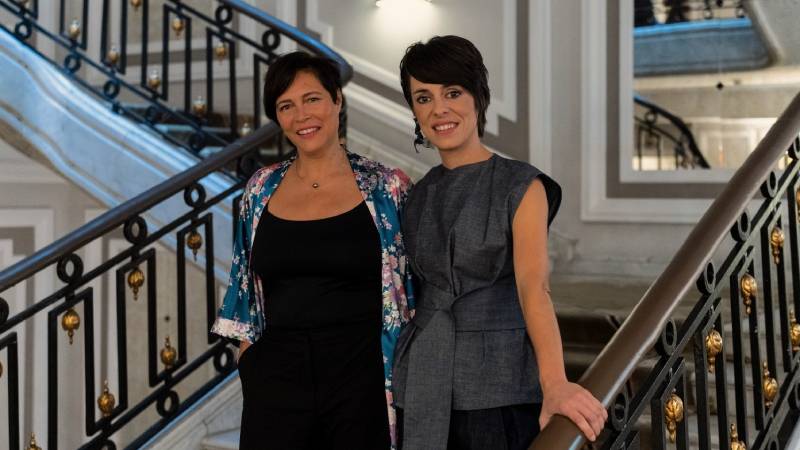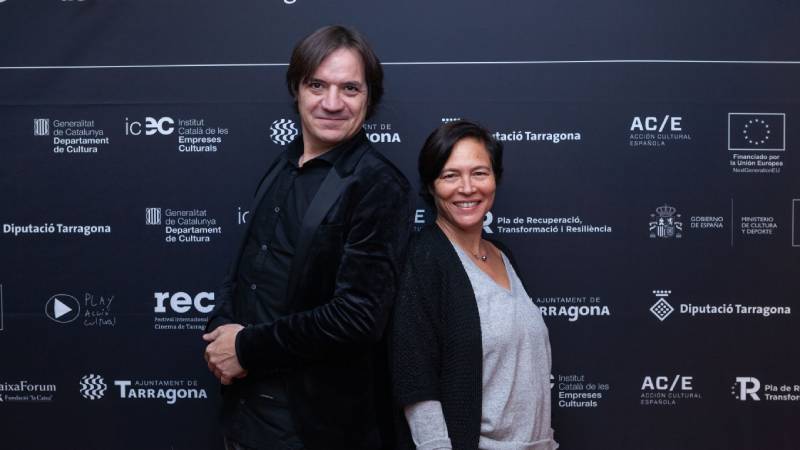




Now on its 23rd edition, the REC Tarragona International Film Festival is a meeting point for filmmakers, industry pundits and movie lovers. The event has two competitive strands, as well as a film incubator known as RecLab. DMovies‘ editor Victor Fraga met with Monaco-born Valerie Delpierre, the founder of Inicia Films, the woman who helped to catapult Pilar Palomero, Estibaliz Urresola Solaguren and recent Golden Dear winner Carla Simon to fame. She also the producer behind Paula Ortiz’s Teresa, which opened the Festival this year.
They talk about the importance of industry labs, working with female directors, reaching the UK market, and the linguistic and cultural diversity of Spanish cinema!
…
.
Victor Fraga – Please tell us about your film journey until you reached Tarragona, and the significance of taking part at REC.
Valerie Delpierre – I had many experiences at REC. For example, last year we went to the work-in-progress Lab. I took 20,000 Species of Bees (Estibaliz Urresola Solaguren, 2023), we were in the process of editing it. The director and us producers believed that we were very close to the final version. We went to REC for the final feedback coming from professionals. People used to watching films, and who can also advise on how to improve editing. That’s because you get so close to your own material that you lose sight of what you are doing. It was very useful. From there we went to Berlin. We thought we could go to Generation [a secondary strand at the Berlinale], but the advice was so good that we ended up getting into the Official Competition!
VF – You have produced what’s perhaps the most beautiful and devastating film from the perspective of a small child that I have seen in my life. Please tell us how Summer 93 (Carla Simon, 2017) came to being?
VD – Carla and I had the opportunity to work together on a short film. She was a friend of someone working with us. She was in her final year at the London Film School. She needed a producer here because she was living in the UK, and the whole film took place in Catalonia. The film was called Those Little Things. So I asked her whether she planned to do a feature film, and she sent me a couple of pages, and I thought it could be a great film. It was such a personal project. I thought we should find a way to transform it into a movie, not just personal therapy. So we started shooting!

VF – Motherhood (Pilar Palomero, 2022), similarly to in Summer 1993, used non-professionals to outstanding results. Is this a mere coincidence? Do you regularly work with such actors?
VD – The director decides and I just follow them. It’s never a random decision, it has to make sense. In Motherhood, it made sense because Pilar found this group of girls who already lived together. They had the energy, the emotional experience and the complicity. It really trust Pilar because we worked together in Schoolgirls (2020), another feature film with non-professionals. I just knew she could do it!
VF – Could you please tell us about the journey of 20,000 Species of Bees, from Berlin all the way to general release in many European countries, including the UK. Except for Almodovar, this is a rare achievement for Spanish cinema, and perhaps even more for Basque cinema?
VD – Almodovar and [Alejandro] Amenabar!!!
That was something amazing with Summer 93, but this was seven years ago, and things have changed a lot since. It was a great opportunity to reach audiences in cinemas before it reached platforms. Fiorella from Luxbox did a great job. We put a lot of effort into finding the right distributor.
VF – Spanish cinema is increasingly diverse from a cultural and linguistic perspective. You have done Basque [20,000 Species of Bees], Catalan [Summer 93] and Aragonese [Motherhood] cinema, and a Galician film won San Sebastian for the first time this year [Jaione Camborda’s The Rye Horn]. What is it that enabled such phenomenon, such decentralisation to take place?
VD – That’s mainly because we have a diverse number of filmmakers, male and female, coming from many parts of the country. We are very different from France. It took a long time for French cinema to tell a story outside Paris. We have an industry set in Catalonia, Galicia, Andalucia, etc. It has to do with politics. We are close to federalism. It’s also a question of maturity. And we have regional funds.
VF – You have worked almost entirely with female filmmakers, except perhaps for Alex Lora. Is this a conscious choice?
VD – Not really, but I’m very happy with the results [laughs]. I have also worked with a few male directors.
VF – Does it make a difference working with male and female directors?
VD – Not really; it’s more to do with the individual. Working with Pilar, Carla, Estibaliz is different. On the other hand, we try to get at least 50% of the team to be women.
VF – Are international co-productions the way forward, or can such arrangements compromise the integrity of the story being told?
VD – A co-production should never compromise the integrity of the story. It has to work with the ideal of the film. It’s also a question of maturity. I used to focus on first feature films, meaning it’s not easy to find producers abroad. I feel more prepared to do an international co-production now.

VF – What is your message to emerging Spanish filmmakers struggling to finance their first film?
VD – Well, I don’t think it’s that hard to finance your first feature in Spain. Now if you want to be ambitious, then it’s more difficult. This means making a film with more than €3 million, or making your second or your third feature film.
VF – Any comments on the political events that shook Spain in the past two weeks [the reelection of the Socialist Party, and the controversial amnesty of Catalonian leaders), and whether they may affect Spanish cinema at all?
VD – Unfortunately politicians are relevant to our industry [laugh]. We have to wait and see how the ministers will act. Right now, I would say it’s positive. We can count on their support.
.
Valerie is pictured at the top of this article. On the second image, she is pictured with Estibaliz Urresola Solaguren). On the third image, she is pictured alongside Javier Garcia Puerto, REC’s artistic director. Images by Inicia Films and REC.





















